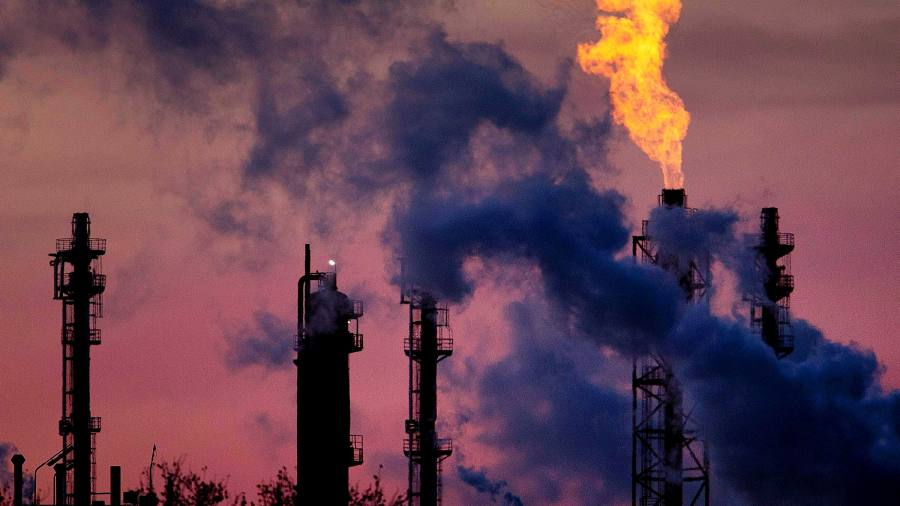[ad_1]
A serious shortage of natural gas supplies could trigger “a chain reaction with unforeseeable consequences” for the German economy, said Commerzbank, one of the country’s biggest corporate lenders.
The German bank warned on Wednesday of a “severe recession” in the country if Russia cuts off gas supplies, saying it could trigger an economic crisis similar “to the one that occurred after the financial crisis in 2009”.
Commerzbank added that the rationing of gas would then “probably be inevitable”.
Germany’s banks are particularly exposed to the huge increase in gas prices triggered by Russia’s move last month to sharply reduce supplies. Prior to Moscow’s invasion of Ukraine, Germany imported 55 per cent of its natural gas from Russia, but supplies through the Nord Stream 1 pipeline have fallen to a fifth of its capacity and policymakers fear that they might be cut completely.
In such a scenario, German economic activity would shrink by 2.7 per cent this year and 1.1 per cent in 2023, Commerzbank estimates. The IMF, which slashed its GDP forecast for Germany last month, still predicts an 1.2 per cent increase in GDP for 2022 and a 0.8 per cent increase next year. Commerzbank chief executive Manfred Knof said he still had “ambitious feelings” about Germany’s economic prospects.
The German government is preparing for gas rationing this winter and frantically trying to find other sources, encourage energy savings and fill up the country’s gas storage.
Commerzbank said the impact of shortages would spread quickly through the German economy since natural gas is not just a crucial source of energy but is also an important raw material used in other industries.
The bank said the chemicals and plastics industry accounted for 1.1 per cent of its credit exposure. Other sectors highly exposed to potential shortfalls in gas supplies and surging energy costs — utilities, construction and the paper industry — contribute another 3.8 per cent of the bank’s loan book of €384bn.
The lender pointed to BASF, the world’s largest chemicals company by revenue, which has said that the group’s vast production site in Ludwigshafen would have to be shut down should gas supplies fall below 50 per cent.
However, global players such as BASF can temporarily soften potential supply setbacks thanks to their plants in the Americas, Asia and less affected parts of Europe, Commerzbank added.
The warnings came as Commerzbank reported a €228mn hit from the economic fallout of the war in Ukraine in the second quarter.
However, the lender swung to a bigger than expected net profit in the period, as higher interest rates and increased commission income pushed up quarterly revenue by 30 per cent to €2.4bn. Net profit in the quarter was €470mn, compared with a loss of €527mn the year before. Analysts had on average expected a profit of €370mn, according to a poll published by the bank.
Shares in Commerzbank, which have fallen more than 20 per cent over the past six months, were up 2.6 per cent in Frankfurt on Wednesday afternoon.
Anke Reingen, an analyst at RBS Capital Markets, said while the bank’s results were positive, the “gas outlook remains a material overhang” for the lender.
Commerzbank’s level of loans in default in the quarter rose 8.9 per cent to €1.53bn and it expects to book take a €700mn hit from loan loss provisions in the full year. Should gas supplies stop completely, the burden would almost double to up to €1.3bn.
The group said it was on track to meet its 2022 profit target of more than €1bn should Germany be able to avoid a recession triggered by gas shortages.
“We are well equipped for upcoming challenges,” said chief financial officer Bettina Orlopp. The bank’s common equity tier 1 ratio, a vital benchmark of its balance sheet strength, rose 13.7 per cent, compared with 13.5 per cent in the first quarter.
[ad_2]
Image and article originally from www.ft.com. Read the original article here.

